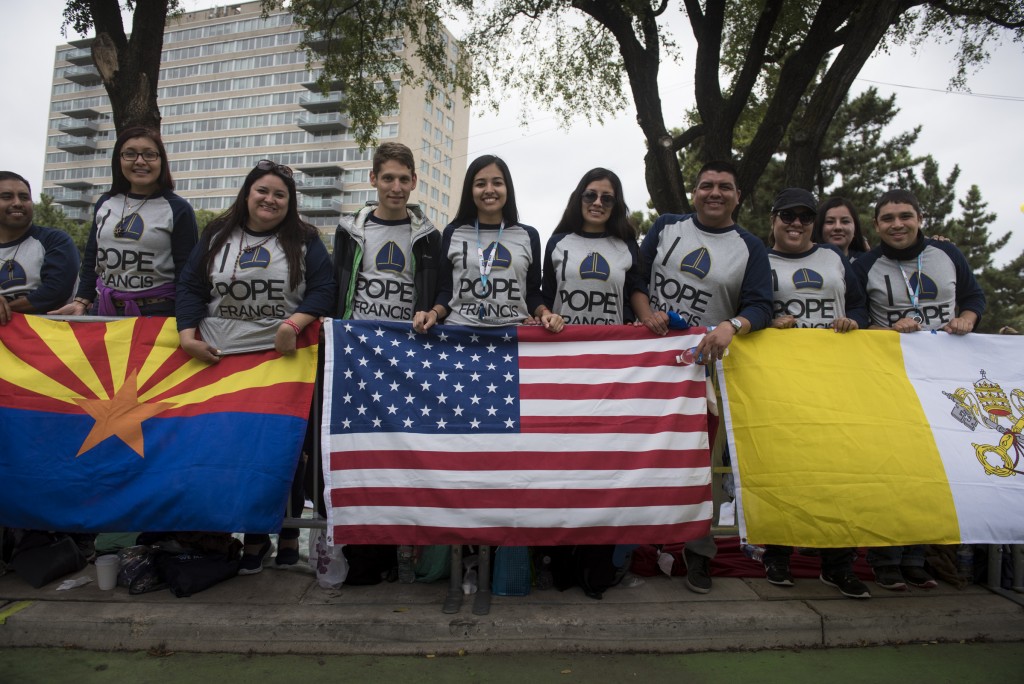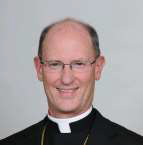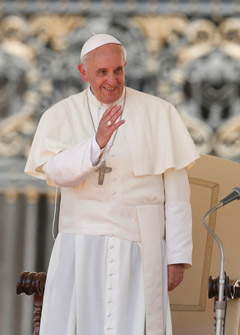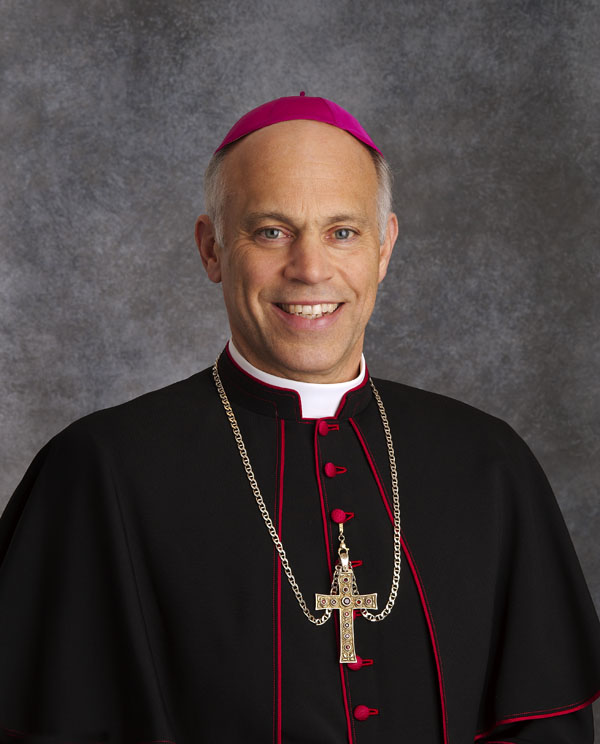Bishop DiLorenzo on Marriage

Statement posted September 13, 2016
More than a year after the U.S. Supreme Court’s ruling on marriage, and despite recent statements from the campaign trail, the Catholic Church’s 2000-year-old teaching to the truth about what constitutes marriage remains unchanged and resolute.
As Catholics, we believe, all humans warrant dignity and deserve love and respect, and unjust discrimination is always wrong. Our understanding of marriage, however, is a matter of justice and fidelity to our Creator’s original design. Marriage is the only institution uniting one man and one woman with each other and with any child who comes from their union. Redefining marriage furthers no one’s rights, least of all those of children, who should not purposely be deprived of the right to be nurtured and loved by a mother and a father.
We call on Catholics and all those concerned for preserving this sacred union to unite in prayer, to live and speak out with compassion and charity about the true nature of marriage – the heart of family life.
Archive
Faithful Witness to Marriage
This article was originally posted on the USCCB blog here.
By Archbishop Joseph E. Kurtz, Bishop Richard J. Malone and Archbishop Thomas G. Wenski
Questions revolving around marriage and human sexuality are deeply felt in our homes and communities. We join with our Holy Father Pope Francis in affirming the inviolable dignity of all people and the Church’s important role in accompanying all those in need. In doing so, we also stand with Pope Francis in preserving the dignity and meaning of marriage as the union of a man and a woman. The two strands of the dignity of the person and the dignity of marriage and the family are interwoven. To pull apart one is to unravel the whole fabric.
When a prominent Catholic politician publicly and voluntarily officiates at a ceremony to solemnize the relationship of two people of the same-sex, confusion arises regarding Catholic teaching on marriage and the corresponding moral obligations of Catholics. What we see is a counter witness, instead of a faithful one founded in the truth.
Pope Francis has been very clear in affirming the truth and constant teaching of the Church that same-sex relationships cannot be considered “in any way similar or even remotely analogous to God’s plan for marriage and family.”(1) Laws that redefine marriage to deny its essential meaning are among those that Catholics must oppose, including in their application after they are passed.(2) Such witness is always for the sake of the common good.
During our Holy Father’s remarkable visit to us last year, he reminded us that all politicians “are called to defend and preserve the dignity of [their] fellow citizens in the tireless and demanding pursuit of the common good, for this is the chief aim of all politics.”(3) Catholic politicians in particular are called to “a heroic commitment” on behalf of the common good and to “recognize their grave responsibility in society to support laws shaped by these fundamental human values and oppose laws and policies that violate [them].”(4)
Faithful witness can be challenging—and it will only grow more challenging in the years to come—but it is also the joy and responsibility of all Catholics, especially those who have embraced positions of leadership and public service.
Let us pray for our Catholic leaders in public life, that they may fulfill the responsibilities entrusted to them with grace and courage and offer a faithful witness that will bring much needed light to the world. And may all of us as Catholics help each other be faithful and joyful witnesses wherever we are called.
—
Archbishop Joseph E. Kurtz of Louisville, Kentucky, is president of the U.S. Conference of Catholic Bishops; Bishop Richard J. Malone of Buffalo, New York, is chairman of the USCCB Committee on Laity, Marriage, Family Life and Youth; and Archbishop Thomas G. Wenski of Miami, is chairman of the USCCB Committee on Domestic Justice and Human Development.
—–
1 Amoris Laetitia (2016), no. 251.
2 See USCCB, Forming Consciences for Faithful Citizenship (2015), no. 23; Congregation for the Doctrine of the Faith, Considerations Regarding Proposals to Give Legal Recognition to Unions between Homosexual Persons (2003), no. 5
3 Address to Congress, September 24, 2015.
4 Faithful Citizenship, no. 39.
Archive
USCCB Chairmen Urge Support for the “First Amendment Defense Act”
 Urging support for the First Amendment Defense Act Archbishop Salvatore J. Cordileone of San Francisco, chairman of the U.S. Conference of Catholic Bishops (USCCB) Subcommittee for the Promotion and Defense of Marriage and Archbishop William E. Lori of Baltimore, chairman of the Ad Hoc Committee for Religious Liberty, issued the following statement on July 12, 2016:
Urging support for the First Amendment Defense Act Archbishop Salvatore J. Cordileone of San Francisco, chairman of the U.S. Conference of Catholic Bishops (USCCB) Subcommittee for the Promotion and Defense of Marriage and Archbishop William E. Lori of Baltimore, chairman of the Ad Hoc Committee for Religious Liberty, issued the following statement on July 12, 2016:
Today the House Oversight and Government Reform Committee will hold a hearing on the First Amendment Defense Act (FADA). The USCCB has been vocal in support of this legislation, as it would provide a measure of protection for religious freedom at the federal level. FADA is a modest but important step in ensuring conscience protection to faith-based organizations and people of all faiths and of no faith who believe that marriage is the union of one man and one woman, protecting them from discrimination by the federal government. The increasing intolerance toward religious belief and belief in the conjugal meaning of marriage makes these protections essential for continuing faith-based charitable work, which supports the common good of our society. Faith-based agencies and schools should not lose their licenses or accreditation simply because they hold reasonable views on marriage that differ from the federal government’s view.
The definition of marriage as the union of one man and one woman, universally held for centuries, has nothing to do with disrespect for others, nor does it depend on religious belief. Rather, it is based on truths about the human person that are understandable by reason. Faithful to its commitment to serve the best interests of society, the Catholic Church will continue to promote and protect the truth of marriage as foundational to the common good. The Church will also continue to stand for the ability of all to exercise their religious beliefs and moral convictions in public life without fear, and to witness to the truth.
We are pleased to support the First Amendment Defense Act, and we urge Congress to pass this important legislation.
Archive
Intern Post: Reflection on The Spirituality of Marriage and the Family from Amoris Laetitia
Many of my friends who grew up in nominally Catholic households have lamented to me that their family home lacked the richness of the faith that they later came to know through their own practice and study. They went to Mass and Sunday school as kids, maybe said grace before meals or a little bedtime prayer, but otherwise their families didn’t live in a distinctively Catholic way. In hindsight, these young adults consider themselves impoverished by an upbringing that was essentially secular, and they intend for their own marriages and families to have a deeply Catholic character. They prioritize the sacraments, strong catechesis, spiritual and corporal works of mercy, awareness of the liturgical calendar, balancing penance and celebration, and hospitality. Living those things out seems like a daunting task because they are not inheriting a tradition from their families so much as trying to create a new one in the wake of a cultural shift that undermines their efforts.
In the ninth chapter of Amoris Laetitia, Pope Francis offers us some ideas about what Catholic family life can look like. He cites Vatican II, saying that lay spirituality “will take its particular character from the circumstances of… married and family life,” (313). He says, “The spirituality of family love is made up of thousands of small but real gestures,” (315). Through the next several paragraphs he specifically mentions family prayer, supporting one another, caring for one another, showing mercy, giving complete attention to others, and welcoming those outside the family with hospitality. These suggestions are not simply lifestyle choices, take ‘em or leave ‘em. Rather, these concrete actions reflect the life of Christ himself who is present in the family through the grace given to every baptized person and especially through the real graces of the sacrament of marriage.
With all this talk about marriage and family, it might be tempting for those of us who are unmarried to ignore the Church’s advice because it seems irrelevant to this moment in our lives. However, even as a single person, the Pope’s words about marriage are meaningful because they help me to prepare my heart for the marriage the Lord wants for me, instead of the woefully inadequate “Hollywood” version that has been so culturally ingrained. It is tempting to imagine that finding a spouse will tie up all the loose ends in my life and, like the movies, the credits will roll and we’ll live happily ever after. But the Pope warns us all that spouses need “a certain ‘disillusionment’ with regard to one another,” (320) and I think the same can be said of those who are looking for a spouse. I can’t expect another person to fulfill me completely. I am taking to heart his note about “spiritual realism” and the warning that “one spouse not presume that the other can completely satisfy his or her needs,” (320) which is a message that is desperately needed by those of us immersed in popular culture. Additionally, the “small but real gestures” that characterize the spirituality of the family can be practiced by anyone anywhere. For example, we are all called to practice the corporal and spiritual works of mercy, but “feed the hungry” takes on a new urgency when “the hungry” is a distraught 2-year-old tugging on your shirt. Likewise, to “bear wrongs patiently” is practically a heroic virtue when you have to bear the wrong of a sibling who has no remorse and will likely wrong you again. Within our families we have abundant opportunities to practice the virtues that sanctify us and open us to deeper union with the Lord.
When my friends describe what they hope to give their families they usually have specific ideas about praying the rosary as a family or being involved in ongoing community service and the like. However, they usually find a way to express that what they mean when they describe various devotions and practices is that they want their whole lives to be ordered toward the mystery of God’s love. The specific actions are expressions of a real desire to know, love, and serve the Lord. Pope Francis says that “spirituality becomes incarnate in the communion of the family,” (316). As Jesus’ day-to-day life was ordered to the will of the Father, so too the family is called to live their daily lives for Him.
Archive
Made for Freedom
Check out the newest video in the MUR series on marriage and religious freedom! Please share it and spread the word.
Archive
AL Bootcamp: Week 4
May 16
“You hypocrite, remove the wooden beam from your eye first; then you will see clearly to remove the splinter from your brother’s eye” (Mt 7:5).
Pope Francis: “The Gospel tells us to look to the log in our own eye (cf. Mt 7:5). Christians cannot ignore the persistent admonition of God’s word not to nurture anger: ‘Do not be overcome by evil’ (Rm 12:21). ‘Let us not grow weary in doing good’ (Gal 6:9). It is one thing to sense a sudden surge of hostility and another to give into it, letting it take root in our hearts: ‘Be angry but do not sin; do not let the sun go down on your anger’ (Eph 4:26)” (Amoris Laetitia, no. 104).
Meditate on one of these Scripture passages today. Try to repeat it to yourself throughout the day, especially when you are tempted to anger.
May 17
“Be angry but do not sin; do not let the sun go down on your anger” (Eph 4:26).
Pope Francis: “My advice is never to let the day end without making peace in the family. ‘And how am I going to make peace? By getting down on my knees? No! Just by a small gesture, a little something, and harmony within your family will be restored. Just a little caress, no words are necessary. But do not let the day end without making peace in your family’. Our first reaction when we are annoyed should be one of heartfelt blessing, asking God to bless, free and heal that person” (Amoris Laetitia, no. 104).
Tonight, think over your day and your relationships with your family. Figure out if there’s anyone you should apologize to before bed, and do it.
May 18
“Love does not brood over injury” (1 Cor 13:5).
Pope Francis: “Once we allow ill will to take root in our hearts, it leads to deep resentment. The phrase ou logízetai to kakón means that love ‘takes no account of evil’; ‘it is not resentful’. The opposite of resentment is forgiveness, which is rooted in a positive attitude that seeks to understand other people’s weaknesses and to excuse them… Something is wrong when we see every problem as equally serious; in this way, we risk being unduly harsh with the failings of others” (Amoris Laetitia, no. 105).
Today, pay attention to whether you are falling into the trap of making much out of little. As the well-known book holds, “Don’t sweat the small stuff.” Think about your grievances in light of eternity.
May 19
“Father, forgive them, they know not what they do” (Lk 23:34).
Pope Francis: “Today we recognize that being able to forgive others implies the liberating experience of understanding and forgiving ourselves… We need to learn to pray over our past history, to accept ourselves, to learn how to live with our limitations, and even to forgive ourselves, in order to have this same attitude towards others” (Amoris Laetitia, no. 107).
Mother Mary Francis, a Poor Clare, wrote to her sisters once that the quickest way to “kill” charity is to be too hard on yourself. If you hold yourself to an unrealistic standard, you will do the same to others. Accept your own imperfections today with a laugh and a trusting prayer for mercy.
May 20
“Love does not brood over injury” (1 Cor 13:5).
Pope Francis: “All this assumes that we ourselves have had the experience of being forgiven by God, justified by his grace and not by our own merits. We have known a love that is prior to any of our own efforts, a love that constantly opens doors, promotes and encourages. If we accept that God’s love is unconditional, that the Father’s love cannot be bought or sold, then we will become capable of showing boundless love and forgiving others even if they have wronged us” (Amoris Laetitia, no. 108).
When you experience forgiveness, you know what a gift it is and can then extend it to others. God’s love precedes anything that you do. Today, focus on letting your family members see that your love for them is not dependent on their actions.
May 21
“Love rejoices with the truth” (1 Cor 13:6).
Pope Francis: “The expression chaírei epì te adikía has to do with a negativity lurking deep within a person’s heart. It is the toxic attitude of those who rejoice at seeing an injustice done to others. The following phrase expresses its opposite: sygchaírei te aletheía: ‘it rejoices in the right’” (Amoris Laetitia, no. 109).
The idea of being glad at someone else’s misfortune is such a common temptation that there’s actually a word for that in German: schadenfreude. It’s an ugly thing. Today practice “rejoicing in the right” by noticing at least one thing your spouse or child(ren) does and acknowledging it with a heartfelt “thank you”.
Archive
AL Bootcamp: Week Three
May 9
“Love is not rude” (1 Cor 13:5).
Pope Francis: “To love is also to be gentle and thoughtful, and this is conveyed by the next word, aschemonéi. It indicates that love is not rude or impolite; it is not harsh. Its actions, words and gestures are pleasing and not abrasive or rigid. Love abhors making others suffer. Courtesy ‘is a school of sensitivity and disinterestedness’ which requires a person ‘to develop his or her mind and feelings, learning how to listen, to speak and, at certain times, to keep quiet’ (Octavio Paz, La llama doble, Barcelona, 1993, 35)” (Amoris Laetitia, no. 99).
It is easy to take things for granted in the family and to drop the “niceties” that we use for “company.” But Pope Francis always reminds us to say, “Please,” “Thank you,” and “May I?” to our family members. Here he’s asking us to be intentional about gentleness. Tonight, at dinner, make a conscious effort to speak with courtesy.
May 10
“Love is not rude” (1 Cor 13:5).
Pope Francis: “Every day, ‘entering into the life of another, even when that person already has a part to play in our life, demands the sensitivity and restraint which can renew trust and respect. Indeed, the deeper love is, the more it calls for respect for the other’s freedom and the ability to wait until the other opens the door to his or her heart’” (Amoris Laetitia, no. 100).
It can be hard to wait for your spouse to open up to you, if you know that there is something on his or her mind. Sometimes when it comes to waiting for big things, it helps if we practice by waiting for small things. Today, if you have a treat in your lunch, save it for after work.
May 11
“Love is not rude” (1 Cor 13:5)
Pope Francis: “To be open to a genuine encounter with others, ‘a kind look’ is essential… [it] helps us to see beyond our own limitations, to be patient and to cooperate with others, despite our differences. Loving kindness builds bonds, cultivates relationships, creates new networks of integration and knits a firm social fabric… In our families, we must learn to imitate Jesus’ own gentleness in our way of speaking to one another” (Amoris Laetitia, no. 100).
It can be very difficult to look kindly at a child who is acting out, or at our spouse when he/she doesn’t hear what you said for the nth time. Today, look at your family members and say to yourself, “Jesus is looking at them right now too.” That can help change the way that you see them.
May 12
“Love does not seek its own interests” (1 Cor 13:5).
Pope Francis: “We have repeatedly said that to love another we must first love ourselves. Paul’s hymn to love, however, states that love ‘does not seek its own interest’, nor ‘seek what is its own’. This same idea is expressed in another text: ‘Let each of you look not only to his own interests, but also to the interests of others’ (Phil 2:4)” (Amoris Laetitia, no. 101).
There is a paradox in the Christian life: the love of self and the love of neighbor are intimately connected. Today, plan to savor a moment “with” yourself at some point – over a cup of coffee or with a good book perhaps.
May 13
“Love does not seek its own interests” (1 Cor 13:5)
Pope Francis: “Saint Thomas Aquinas explains that ‘it is more proper to charity to desire to love than to desire to be loved’; indeed, ‘mothers, who are those who love the most, seek to love more than to be loved’. Consequently, love can transcend and overflow the demands of justice, ‘expecting nothing in return’ (Lk 6:35), and the greatest of loves can lead to ‘laying down one’s life’ for another (cf. Jn 15:13)” (Amoris Laetitia, no. 102).
Recall a particular way in which your own mother sought to love rather than to be loved. If she’s still alive, give her a call today to thank her for that memory. If she has passed away, pray for her. Entrust her to the care of Our Lady of Fatima.
May 14
“Love is not quick-tempered” (1 Cor 13:5).
Pope Francis: “The word [St. Paul] uses next – paroxýnetai – has to do more with an interior indignation provoked by something from without. It refers to a violent reaction within, a hidden irritation that sets us on edge where others are concerned, as if they were troublesome or threatening and thus to be avoided. To nurture such interior hostility helps no one” (Amoris Laetitia, no. 103).
Sometimes we overreact to something that happens in our day because secretly in our hearts we have been brooding over a hurt or a slight that happened earlier. Today, be on guard against that. Acknowledge a hurt sooner rather than later and seek to heal it through the mercy of Jesus.
Archive
Intern Post: The Mercy of Indissolubility
Growing up with three brothers, I remember a lot of forced apologies being exchanged back and forth between us. My parents would make us say the words before we were actually ready to apologize for (or forgive) whatever nastiness was inflicted that day. But however hurt or angry we were at the moment, there was never a question in our minds about whether we loved one another. We belonged to each other and wouldn’t have had it any other way. Being family and loving one another went hand-in-hand.
Love sees beyond what is broken, rude, selfish, or mean in the other person’s action and reaches out a hand to heal the relationship. By making my brothers and me practice forgiveness in the everyday offenses of life, my parents were leading us to understand mercy: it makes things right between us.
Throughout the Old Testament we see a cycle of betrayal and mercy played out between Israel and the Lord. Over and over, Israel abandons God for their own desires, but the Lord continually draws her back to himself because he chose her and he is faithful to the covenant he made. In the book of Hosea in particular, the relationship of a married couple is used to reveal the steadfastness of God’s love for Israel. No matter what she does, He remains faithful.
A sacramental marriage helps those who witness it to understand God’s fidelity to his people. Indissolubility is a gift of mercy, because it makes the relationship of the couple true to what love is: a complete gift of oneself that can’t be taken back. A person in love does not promise their beloved the next three years; they promise forever![1] “The gift of indissolubility means that despite the vicissitudes and suffering that come with human failure and sin, the sacramental marriage bond remains an abiding source of mercy, forgiveness, and healing.”[2] To deny the indissolubility of marriage would be an affront against the sacrament of marriage because it would deny the reality of grace and its power to heal and perfect a person.
I came across a beautiful reflection about marriage recently on a blog site. A woman was reflecting on her experience of learning to have mercy on her husband who was struggling with clinical depression. She said, “Through mercy, God taught me to love my husband as we all deserve to be loved—with a love devoid of self, thinking only of the good of the other person.”[3] While her husband was sick, she, “picked up his cross for him, as Jesus does for us, and bore his malaise and withdrawal in loving silence.” By showing mercy rather than demanding justice, the couple was able to maintain peace and goodwill during his illness. Mercy itself is not a cure for depression, but it helped this couple to preserve their relationship in a difficult time. The wife realized that she needed to be kind and selfless, and not seek justice but rather have mercy, and finally when she did that she found, “I no longer cared about justice.”
It can be said of the practice of reconciliation that it “washes away small offenses, but it also protects from great offenses. Pardon confers a habitus of communion.”[4] Mercy towards siblings, in my case, and a husband in the case of the blog contributor is an expression of a disposition toward communion. It is a desire to be united to the other person, even after they have hurt you. A married couple that frequently seeks and offers mercy reinforces their “togetherness” or communion so that when serious trials arise they have already practiced drawing towards one another. The indissoluble bond of marriage not only calls a couple to be merciful toward each other, but indissolubility also reveals God’s own mercy, because when he binds two people together in the sacrament, he gives them the graces they need to live it out.
[1] There is a new concept about marriage out there these days called a “wed-lease,” which turns marriage into something more like a business contract: https://www.washingtonpost.com/opinions/a-high-divorce-rate-means-its-time-to-try-wedleases/2013/08/04/f2221c1c-f89e-11e2-b018-5b8251f0c56e_story.html. This is not true to what love is.
[2] Healy, N. (2014). The Merciful Gift of Indissolubility. Communio International Catholic Review, 41.2. Retrieved from http://www.communio-icr.com/files/healy41-2.pdf
[3] “Ode to Feminine Genius: A Merciful Woman.” Catholic Sistas. Aug. 28, 2014. http://www.catholicsistas.com/2014/08/ode-feminine-genius-merciful-woman/
[4] Laffitte, J.(2015). The Choice of the Family. New York: Image, p. 143.
Written by the Spring Intern in the Promotion and Defense of Marriage Secretariat.
Archive
A Culture of the Temporary: Pope Francis
 Photo credit: Jeffrey Bruno
Photo credit: Jeffrey Bruno
Pope Francis at the World Meeting of Families: Seven Great Quotes
Pope Francis’s trip to the United States in September centered on his appearance at the World Meeting of Families in Philadelphia. Here is the fifth quote, from the meeting with bishops on September 26:
“Today’s culture seems to encourage people not to bond with anything or anyone, not to trust.”
As noted last week, fidelity as a virtue is no longer upheld in the culture. This is one contributing factor to the phenomenon that Pope Francis points to in today’s quote: young people are marrying at a far lower rate now than in the past. The capacity to bond with another person, to commit to them, and to entrust yourself to them, seem to be diminishing. The culture does not encourage qualities like trust, listening, patience, vulnerability, or commitment, all of which are necessary for marriage.
The fact of widespread divorce has resulted in many adult children who do not have personal experience or support of parents who have remained faithful to their spouses. They are understandably more anxious about making a lifetime commitment, because they fear that they, too, will “fail”.
Even if their parents are married, many young people buy into the lie that they need to “try the other person out” sexually before they make a commitment. Ironically, engaging in premarital sex with multiple partners actually diminishes the physical and chemical bond that forms through the sexual act, thus diminishing the likelihood of commitment rather than increasing it. This attitude toward sex plays directly into what Pope Francis calls the “throwaway culture.” Instead of seeing another person as a gift, a person who should be loved and never used, a man or woman sees the other as a possibility for “fun” or “release” without regard to their dignity or to the future.
Young adults often turn to cohabitation as a way of “easing in” to a commitment, which turns out to be counter-productive, as these relationships are less stable by design. Accustomed to living together without marriage, these couples also appear less likely to stay married when trouble comes. Researcher Brad Wilcox concludes that living in a cohabitating household is now the largest problem for children in America.
Social media and other forms of technology also seem to feed into a culture where there are no strong bonds between people. As MIT researcher Sherry Turkle notes, “Once we remove ourselves from the flow of physical, messy, untidy life — and both robotics and networked life do that — we become less willing to get out there and take a chance” (Alone Together). Connections through technological means are more frequent but less deep, and almost never require sacrifice. It is no wonder, then, that young people have a harder time choosing to commit to one person for the rest of their life, when they have not practiced faithful, sacrificial friendship.
Marriage, then, is like a revolt against the culture of the temporary. As Pope Francis said at World Youth Day in 2013: “I ask you, instead, to be revolutionaries, to swim against the tide; yes, I am asking you to rebel against this culture that sees everything as temporary and that ultimately believes that you are incapable of responsibility, that you are incapable of true love.”
Archive
Bishop Conley: “To Deny Reality”
 Bishop Conley of the Diocese of Lincoln, Nebraska wrote a column in the Southern Nebraska Register entitled “To Deny Reality” referencing the Supreme Court decision that redefined marriage throughout the country.
Bishop Conley of the Diocese of Lincoln, Nebraska wrote a column in the Southern Nebraska Register entitled “To Deny Reality” referencing the Supreme Court decision that redefined marriage throughout the country.
Bishop Conley began the column speaking about the call to all human persons to “live in families patterned after the divine communion of the Most Holy Trinity, the divine family of God.” He continued on to say that, “Because God created us to live in the image of his divine communion, children have a natural right to live in families of one man and one woman.”
Bishop Conley used quotes from the 2003 document from the Congregation for the Doctrine of the Faith “Considering Regarding Proposals to Give Legal Recognition to Unions between Homosexual Persons” which is still the touchstone Vatican document on this question. The bishop showed that the government has done harm to the common good by ignoring the fundamental value of the natural family, and said that “Catholics cannot deny reality.”
Drawing practical conclusions from the Vatican document, Bishop Conley explained to the faithful: “Catholics cannot directly facilitate any government action to sanction same-sex unions as marriage. And they must resist even cooperation in same-sex marriage.” He noted that this may sometimes mean leaving one’s position, which he called a “heroic witness.” He asked any Catholic who finds him- or herself in this position to speak to his or her pastor about it. And finally, Bishop Conley reminded his readers that God gives us the grace to be faithful to Him, and, “Everything we do should be in gratitude to that grace. And each of us should do all that we can to reveal that truth to the world.”
Archive
USCCB Amicus Brief
On April 2, 2015, the USCCB submitted an amicus curiae brief with the Supreme Court in Obergefell v. Hodges, supporting the right of states to define marriage as the union of one man and one woman.
The basic arguments of the brief are as follows:
- The Catholic Bishops support the legal definition of marriage as the union of one man and one woman out of love, justice, and concern for the common good
- When it uniquely reinforces the union of one man and one woman, the law furthers the interests and well-being of children.
- When it uniquely reinforces the union of one Man and one Woman, the law furthers the interests and well-being of mothers and fathers.
- The legal definition of marriage as the union of one man and one woman is not based on hatred, bigotry, or “animus” or any other impermissible purpose or classification.
- When it draws distinctions based on conduct rather than status or inclination, the law does not reflect hatred, bigotry, or “animus.”
- When it treats one type of conduct differently from conduct with very different practical consequences, the law does not reflect hatred, bigotry, or “animus.”
- When it reinforces norms that happen to correspond with religious beliefs, the law does not impermissibly endorse religion
- When it declines to specially reinforce a particular relationship between persons, the law does not thereby “ban” that relationship or make it “illegal.”
- A holding that the unique affirmation of man-woman marriage is grounded in hatred, bigotry, or “animus” would needlessly create Church-State conflict for generations to Come.
Archive
Archbishop Coridileone supports SMDA
Representative Randy Weber and Senator Ted Cruz reintroduced legislation into the House and Senate that would protect states’ marriage amendments: the State Marriage Defense Act. Archbishop Cordileone sent them each a letter of support (Cruz and Weber) and announced this for the media.
Let us keep praying and fasting!
Archive
A Dialogue on Marriage: Part Three
 This is Part Three of a Six-Part series on the question, “What is Marriage?” Please check out parts one and two before this!
This is Part Three of a Six-Part series on the question, “What is Marriage?” Please check out parts one and two before this!
Socrates: So Bob, have you had a chance to think about what we talked about last time?
Bob: Yes, I have, and I realized that you are missing a really important fact.
Socrates: I am?
Bob: Yes. You are presenting the ideal. I’m talking about what’s real. There are a lot of children who, for lots of reasons, can’t be raised by their biological mother and father.
Socrates: I know that.
Bob: Well if that’s true, then it means that we have to accept the reality of the situation and try to do something good for the child, even if it is not ideal.
Socrates: You’re right. What are you proposing?
Bob: One of the ways we can help children is by allowing a same-sex couple to adopt them, thus creating a family.
Socrates: That’s a bit of a leap, isn’t it?
Bob: What do you mean?
Socrates: I mean that you looked compassionately at a tragic situation that many children find themselves in, and then jumped to a “solution” that doesn’t actually meet the need that they are experiencing.
Bob: I’m sorry; I still don’t quite follow you.
Socrates: Let’s say that a child is born to a mother and a father, who are both subsequently killed in a car accident. There is no other family, and the child is placed under the care of the state. That seems like the worst thing that can happen to the child, right?
Bob: Right. Even losing just one parent is terribly traumatic for a child.
Socrates: Exactly. So what has the child lost, when his or her parent dies?
Bob: The child has lost the real-life connection to and support of his or her mother and father; a relationship that should have guided the child into adulthood.
Socrates: Right. Like we talked about last time, a child would miss not just the functions that a mom and dad serve; he or she would miss the relationship to a person of each sex who relate to the child in a unique way, as well as the chance to observe the mom and dad relating to each other.
Bob: Yes, that’s right.
Socrates: Can you see how your solution—allowing two persons of the same sex to adopt—does not solve this problem?
Bob: You mean because the child will still be missing either a mom or a dad?
Socrates: Precisely.
Bob: I guess you’re right, but the child is still missing his or her own mom and dad, no matter what adoptive situation comes up. I don’t think it’s that big of a difference to the child whether he or she is adopted by a man and a woman or two people of the same sex, as long as the child is loved.
Socrates: It is true that an adopted child usually loses a real-life connection to their biological parents (at least most of the time) and that’s sad, no matter what happens next.
Bob: Adoption is always a response to a non-ideal situation—to a need or a deprivation experienced. Is that what you mean?
Socrates: Yes. But when the child is adopted by a married mother and father, he or she will still be given a concrete and living relationship with both a mom and a dad. They will still experience those different relationships and be able to observe the relationship between the parents as a model.
Bob: But there are plenty of children who are adopted or being raised by single parents who do just fine .
Socrates: The question of single parenthood is an interesting one and actually distinct from the question of adoption by two persons of the same sex. Perhaps we can take it up again at another time.
FAQ: Why is a child meant to have both a father and a mother?
Archive
Pope Francis Homily for Wedding
On the Feast of the Exaltation of the Holy Cross (September 14, 2014) the Holy Father received the vows of 20 couples, joining in the Sacrament of Marriage. This is an excerpt from his homily, highlighting the beauty of sexual difference:
“The love of Christ, which has blessed and sanctified the union of husband and wife, is able to sustain their love and to renew it when, humanly speaking, it becomes lost, wounded or worn out. The love of Christ can restore to spouses the joy of journeying together. This is what marriage is all about: man and woman walking together, wherein the husband helps his wife to become ever more a woman, and wherein the woman has the task of helping her husband to become ever more a man. This is the task that you both share. “I love you, and for this love I help you to become ever more a woman”; “I love you, and for this love I help you to become ever more a man”. Here we see the reciprocity of differences. The path is not always a smooth one, free of disagreements, otherwise it would not be human. It is a demanding journey, at times difficult, and at times turbulent, but such is life!”
Archive
Tennessee Law Upheld
A Tennessee state trial court on August 5 upheld Tennessee’s non-recognition of a valid out-of-state same-sex “marriage.” This is the first win for marriage in court since U.S. v. Windsor.
In his decision, the judge said, regarding the definition of marriage: “The Court also finds that this should be the prerogative of each State. That neither the Federal Government nor another state should be allowed to dictate to Tennessee what has traditionally been a state’s responsibility, which is to provide a framework of laws to govern the safety and wellbeing of its citizens.” Regarding Windsor, the judge said, “The Windsor case is concerned with the definition of marriage, only as it applies to federal laws, and does not give an opinion concerning whether one State must accept as valid a same-sex marriage allowed in another State. . . . The Supreme Court does not go the final step and find that a State that defines marriages as a union of one (1) man and one (1) woman is unconstitutional.”
Archive
Archbishop Cordileone Responds to Recent Federal Rulings
Check out the press release from the USCCB about the recent rulings on marriage in federal courts. As Chairman of the Subcommittee on the Promotion and Defense of Marriage, Archbishop Cordileone reminds us, “Recent court decisions on marriage in no way deter our efforts to promote the truth about marriage – a truth that no court decision can ever undo.”
Archive
Oklahoma federal ruling
A federal appeals court in Denver struck down Oklahoma’s marriage amendment today. This is the same court responsible for striking Utah’s amendment down. They argue that the U.S. Constitution protects same-sex marriage.
Oklahoma Governor Mary Fallin released a statement, reaffirming her commitment to natural marriage. She said: “In 2004, voters had an opportunity to decide whether or not to allow same-sex marriage in Oklahoma. Seventy-six percent voted not to, and to instead define marriage as the union between one man and one woman. I was one of the many voters who cast my ballot in favor of traditional marriage.”
Archive
European Court for Human Rights
On July 16th, 2014 the European Court of Human Rights ruled that not extending the right to marry to same-sex couples does not violate the European Convention on Human Rights.
The petitioner to the court in this case was a man in Finland who had gone through a sex change and wanted to change his identity. He was told that if he was to do so, he would no longer be recognized as married to his wife: that marriage could be dissolved or transformed into a civil partnership.
The court explained that the European Convention “enshrines the traditional concept of marriage as being between a man and a woman.” Therefore it does not require acceptance of same-sex unions.The majority of the countries in the European Union maintain the true meaning of marriage as a bond between one man and one woman.
There’s an article about this ruling and its possible implications for American at Aleteia.
Archive
Florida Keys Marriage Decision- Updated 7. 23
Yesterday a Circuit Judge in the Florida Keys ruled that Florida’s ban on same-sex “marriage” is unconstitutional.
The judge noted, “The court is aware that the majority of voters oppose same-sex marriage, but it is our country’s proud history to protect the rights of the individual, the rights of the unpopular and the rights of the powerless, even at the cost of offending the majority.” In fact, in Florida, 62% of the voters approved a marriage amendment to recognize the truth that marriage is the union of one man and one woman.
Instead of asking the question of whether those voters had a rational basis for their belief about marriage— which is distinct from a belief about the rights of individuals– the judge in this case dismissed those beliefs as just another kind of prejudice.
There is a great need to educate people about the crucial distinction the Church and others make between the person and their sexual expression. The person is always respected; certain sexual activity may not be.
Archbishop Wenski released a statement about the decision. He reaffirmed the importance of marriage to society and the right of a child to be raised by his or her mother and father.
Archive
Utah to go to Supreme Court
Reprinted from CNS News Brief
Utah to appeal ruling on same-sex marriage ban to U.S. Supreme Court
SALT LAKE CITY (CNS) — Utah’s attorney general said July 9 the state will go straight to the U.S. Supreme Court in hopes of overturning a federal appellate court’s ruling that overturned the state’s ban on same-sex marriage. On the same day in neighboring Colorado, a judge overturned that state’s ban on same-sex marriage. The decision by Colorado District Court Judge C. Scott Crabtree “advances a misinterpretation of the institution of marriage in modern society, reducing marriage to a sheer emotional arrangement that can simply be redefined to accommodate the impulses of culture,” said a July 10 statement by Colorado’s Catholic bishops. “As Catholics, we have a duty to protect and preserve marriage as the union of one man and one woman in our laws and policies. We are called to make this stand because redefining marriage will only further erode the family structure of our society,” the bishops added. Colorado and Utah were two of six states affected by a 2-1 decision issued June 25 by a three-judge panel of the 10th U.S. Circuit Court of Appeals that said states could not deprive people of the right to marry because they chose partners of the same sex. The other four states are Kansas, New Mexico, Oklahoma and Wyoming. It marked the first time a federal appellate court had struck down state same-sex marriage bans. Crabtree’s ruling marked the 16th time a state judge had overturned its state’s same-sex marriage prohibition. In both cases, the judges put their rulings on hold pending probable appeals.



